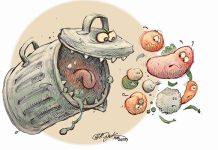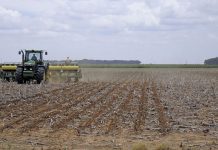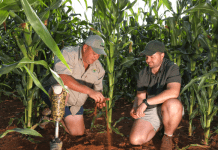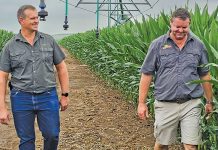
South African farmers are rightfully proud of the fact that this country remains food secure at national level. This is thanks to consistent improvements in yield and total production of most commodities, including fruit and vegetables. How can it be, then, that millions of people in both rural and urban areas remain chronically food insecure, are undernourished and maintain inadequate diets?
In Southern Africa, all four drivers of food insecurity – inadequate availability, access, stability of both supply and access, and individual utilisation – contribute to the problem. By far the greatest barrier is access to sufficient, safe, nutritious and affordable food at household level. Global dietary transitions from cereal, pulse, root or tuber, vegetable and fruit-based diets to the ones rich in refined carbohydrates, sugar, and oils or fats are fuelled by the fact that these foods are, on a calories per gram basis, far cheaper than those they are replacing.
The majority of lower income populations are unable to afford a healthy and balanced diet. The resulting malnutrition,
obesity and related health and child developmental problems will yet bear immense costs to our societies. Yet SA has developed a highly-productive and sophisticated fresh produce industry, in some cases targeting the more lucrative export market. How can the linkages between food production, domestic market needs and health be strengthened and aligned with national development goals, while simultaneously providing growth to the agricultural sector in a sustainable manner?
Insufficient production and consumption
The World Health Organisation (WHO) and the Food and Agriculture Organisation of the United Nations (FAO) recommend a minimum daily intake of fruit and vegetables of 400g per person a day. Of this, it is recommended that at least 200g should be fruit. FAO data shows that between 1990 and 2009, only four Southern African Development Community countries – Tanzania, Swaziland, Malawi and Mauritius – increased their fruit intake to between 150g and 200g. South Africa has stagnated at around 100g while Namibia, Lesotho, Mozambique, Zimbabwe and Zambia are at, or below, 50g.
Fruit consumption across the world is increasing, except in Africa. Asia is expected to soon overtake Africa and reach the minimum target of 200g per person a day by mid-century. In sub-Saharan Africa, a reduction in fruit consumption is projected from about 160g to 120g per person a day by mid-century. No improvement in the consumption of vegetables, roots and tubers, potatoes and pulses is expected over this period.
The key factors which influence fruit and vegetable consumption patterns are low income, high prices and seasonal availability, consumer taste preferences, education level, home production and intra-household decision-making. Weak market integration is an important driver of high prices at local level. Even in urban areas where food supply chains exist and fruit and vegetables are freely available, a lot of people cannot afford, or choose not to buy them. Often, lack of economic access overrides the supply side.
Fruit consumption patterns in SA
On average, 24% of households suffer from food insecurity, according to the 2010 SA General Household Survey. Although nationally, consumption expenditure is strong for oils and fats, meat, bread and grain products and sugar, it is far lower for fruit and vegetables. Arguably, the most vulnerable group is our children. An analysis of a national survey conducted in 1999 showed that children between the ages of one and nine years were consuming only 110g of fruit or vegetables per day. This was a third of the minimum requirement for young children and a quarter for older ones.
Underweight children ate significantly less fruit and vegetables, and low dietary diversity and poor nutrient intake were widespread. In four provinces, 30% to 40% of children had not eaten fruit in the six months prior to the survey, with the national average at 20%. Significantly, the vast majority of both rural and urban households purchased their fruit and vegetables as opposed to growing them themselves, and only those living in Gauteng and the Western Cape were able to afford reasonable provision of these food groups to their children.
More recent data shows that the proportion of malnourished children is increasing in urban areas nationally, while decreasing in rural areas. This suggests that the strong policy and research focus in rural areas is paying dividends, but that urban food insecurity has become a ‘hidden crisis’ linked to a poor understanding of, and lack of attention to complex urban food supply chains and economies.
Finding the right balance
Clearly, sufficient food, including fresh fruit and vegetables, is almost always available in South Africa, but still a high number of people suffer from poor nutrition. The bottlenecks in food systems and food flows are not understood well enough and this requires concerted attention from farmers, distributors, retailers, researchers and policymakers. We suggest that the focus on production and the highly politicised emphasis on farming needs to be re-framed to a larger food systems view, including questions of access (and healthy food choices), food safety, nutrition, behaviour and especially affordability.
All players in the value chain need to be on board in re-focusing the food system from yield and production only, towards better nutritionally secure outcomes. A high concentration of the mid-value chain, causing monopolies and oligopolies, may explain some of the barriers, and the creation of alternative value chains could be an option to be considered. In particular, the fruit and vegetable industries have enormous opportunities to work with breeders, technologists, economists, as well as consumer nutrition and health experts, to find strategies that provide benefits to human well-being while supporting sustainable sectoral growth.
Contact One World on 021 818 2900, or at [email protected]
Contact De Wit Sustainable Options on 021 982 7862, 084 556 3366, or at [email protected]
The views expressed in our weekly opinion piece do not necessarily reflect those of Farmer’s Weekly.













